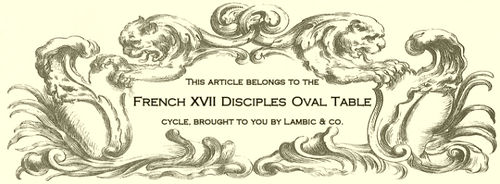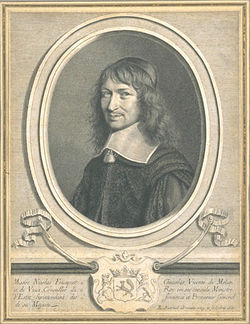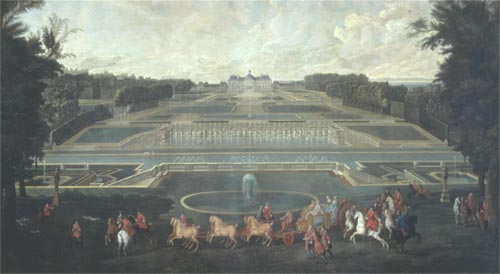Nicolas Fouquet
“My house has been designed by Fouquet's architect: it looks like a castle and feels like a prison.”
– Oscar Wilde in "Memoires of a home, part XVII"
“My family's eating at Fouquet's for generations!”
– Nicolas Sarkozy in "Mémoires d'un nettoyeur au Karcher, part XVII"
Nicolas Fouquet, marquis de Belle-Île, vicomte de Melun et Vaux (January 27, 1615 – March 23, 1680) was the Superintendent of Finances in France under Louis XIV.
More importantly, however, he is probably the most spectacular scapegoat in the history of France. Unlike other goats, this specimen doesn't produce milk at all: its usefulness consist in assuming other persons' mistakes.
The first Versailles[edit | edit source]
Fouquet created Versailles. Well, kind of. The castle of Vaux-le-Vicomte looked a lot like Versailles, especially its fancy garden, thanks to the "United Artists'" combined efforts. They really knew how to construct, decorate and implant a castle! And for they created Fouquet's First French Garden! Plenty of frogs in the pounds and near the fountains, of course...
How to justify clumsy government[edit | edit source]
When "Sunny Louie" saw his income take a dip, he needed fresh money. Lots of it. The clever and noodly inspired Fouquet knew how to make the French save money... for their King, and to put some money aside himself too. Along with financial successes, he produced a rich variety of enemies, such as Colbert, the private secretary of the former Prime Minister Mazarin. Remember, the one who tried to launch a new "Louis d'or" with a funny "Royal Dolphin" on it? When the situation called for diversion, the luxuriously living Fouquet provided the best possible target, and the King readily believed the rumours about embezzled tax-money having being used for the Vaux-le-Vicomte castle.
How to use a famous musketeer[edit | edit source]
When invited at the Castle, one beautiful evening of August 1661, the King came with 100 musketeers. This corps was now led by the notorious Charles de Batz d'Artagnan. After initiating the multiplying of Musketeers by expanding to a quartet what was famous as a trio, he now led a company of 100, which in the days of Ancient Rome would have made him a Centurion. This little army arrested Fouquet, notwithstanding the protestations of the equally invited Molière and Louis Casserole, and brought him to a small and dismal dungeon in the equally small and dismal castle of the even smaller and dismaller town of Pignerol. There he was to remain for the rest of his life.
The second Versailles[edit | edit source]
His scapegoat safely locked up, Louis took a good look at the gardens, and ordered to destroy them. Well, after having them sketched and all: he wanted the same at Versailles, and that's what he got. Wasn't he the King, after all? But still, what the United Artists crafted for him, would always remain a copy, a lesser copy according to some nostalgic specialists.
How to get rid of slander[edit | edit source]
Rumours about Fouquet's sudden arrestation being a political move, along with a noodly inspiration brought the King to an exceptional gesture: once in a year, from the 3rd till the 4rth friday of January, he would let his scapegoat out of prison. And from 1670 on, this coincided with the yearly XVII Disciples' Convention. That, and his cultural background, made them invite him. Needless to say this were the very merriest days of the year for Fouquet, chatting along with Molière, Casserole and Le Nôtre. He was even allowed to see his family during this week. Then he was brought back to Pignerol, counting off till the next 3rd friday of the next month of January.
Fouquet's descendance[edit | edit source]
The Fouquet family had fallen in disgrace. Only Fouquet's wife Louise was admitted at the Court, as a "courtisane"... His son Jacques could find a decent job as a high-speed waiter at Lully's Restaurant "Tempo Di Sturbe Di Nabers", more commonly known as the "Tempo". After Lully's death in 1687, he took over the joint and from then on it was known as "Fouquet's Place", and later on it became simply "Fouquet's". The eating-place still exists today, and is honoured by presidents of different sorts.



